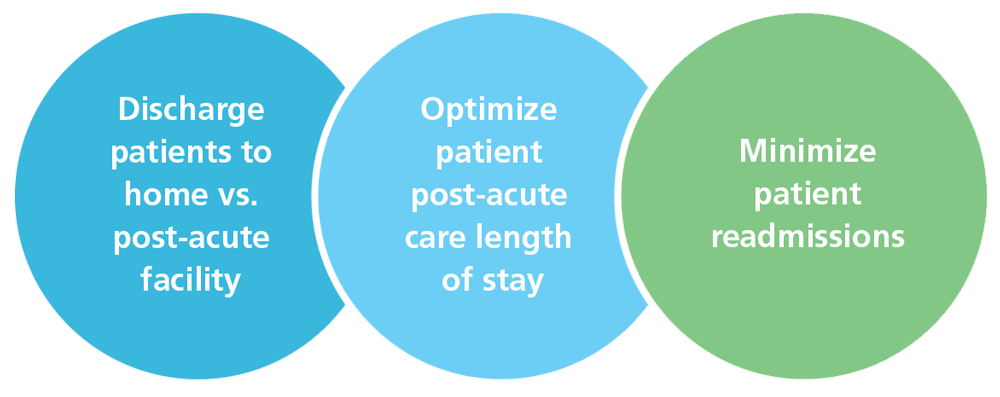VITAS Positively Impacts Bundled Payment Spend and Quality Measures
As a Bundled Payments for Care Improvement Advanced (BPCI-A) awardee participating in episodic care, your success is dependent on reducing costs and improving quality across the care continuum.
VITAS Healthcare can mitigate your organization’s risk by improving longitudinal care coordination and quality while reducing Medicare per-beneficiary spending. VITAS' services can also impact your quality thresholds, including advance care planning and hospital readmission metrics.
Opportunities to Lower Per-Episode Spending

VITAS offers BPCI-A awardees immediate value, resulting in a positive cost comparison to the bundle’s target price.
Patients are eligible for hospice care when a physician clinically determines life expectancy of six months or less if the disease runs its normal course. VITAS tailors individualized care plans that address a wide range of disease symptoms and clinical modalities throughout the care continuum.
The VITAS Longitudinal Care Coordination Continuum Offers:
|
Clinical Care Expertise across all levels of care associated with the Medicare hospice benefit, including continuous care at home for acute symptom management and general inpatient care |
|
Personalized Care Plans specifically developed by VITAS to improve patients' quality of life and CAHPS® scores |
|
Seamless Transitions to wherever the patient resides by dedicated admission personnel |
|
Live and Online Professional Education and materials made available to healthcare providers |
|
Mobile App that provides hospice eligibility guidelines |
How VITAS Helps with Specific Conditions
Patients are eligible for hospice care based on a physician’s clinical determination of a life expectancy of six months or less, if the disease runs its normal course without interventions.
Advanced Cardiac Disease
Heart disease differs significantly from other illnesses, requiring specialized treatment approaches. The individualized hospice plan of care addresses the wide range of heart disease symptoms, including shortness of breath, chest pain, weakness, functional decline and fluid status management.
The VITAS Patient-Centered Approach for Advanced Cardiac Disease:
- VITAS interdisciplinary team's comprehensive evaluation
- Continuation of optimal medical treatment for heart failure to prevent exacerbations
- Utilization of inotropic medications to manage symptoms and provide comfort
- Mechanical support devices such as left ventricular assist devices and related medications
Advanced Neurological Disease
Some patients survive a stroke and the acute hospitalization that follows, but later experience a continuous decline in clinical and/or functional status. For these patients, the prognosis is often poor and they should be evaluated for hospice care.
VITAS’ individualized plan of care addresses the patient’s physical and psychosocial well-being, and seeks to manage a wide variety of symptoms, including:
- Shortness of breath
- Respiratory dysfunction
- Pain resulting from stiff joints, muscle cramps, pressure on skin/joints caused by immobility
- Skin care issues
- Difficulty swallowing
- Impaired hydration and nutrition
- Difficulty communicating
- Depression or anxiety
Advanced Lung Disease
Dyspnea, and the anxiety it causes, are distressing symptoms that patients with both restrictive and obstructive advanced lung diseases experience. Advanced lung disease also contributes to ED utilization and hospitalization. These can often be addressed using a combination of clinical therapies and patient-specific, 24-hour support that hospice offers.
The VITAS Patient-Centered Approach for Advanced Lung Disease:
- VITAS interdisciplinary team's comprehensive evaluation
- Goals of care planning pre-emergency
- Pharmacologic and non-pharmacologic interventions to reduce respiratory distress
- Upon onset of respiratory distress, VITAS responds any time, day or night, using a customized emergency protocol.
Advanced Renal Disease
Dialysis patients are appropriate for hospice care because of their high mortality rate and high symptom burden. Many patients and families with advanced renal disease choose not to start or to withdraw dialysis for multiple reasons, particularly in patients older than 60 years. End-of-life care should also be considered when a patient has a poor prognosis, when dialysis cannot be provided safely, when there is poor performance status, or when dialysis negatively impacts a terminally ill patient’s quality of life.
VITAS’ individualized plan of care addresses the patient’s physical and psychosocial well-being, and seeks to manage a wide variety of symptoms, including:
- Pain
- Fatigue
- Loss of appetite
- Confusion
- Sedation
- Nausea and vomiting
- Itching
- Difficulty breathing
- Difficulty sleeping
- Anxiety
- Depression
- Volume overload
- Symptomatic dialysis treatment when appropriate